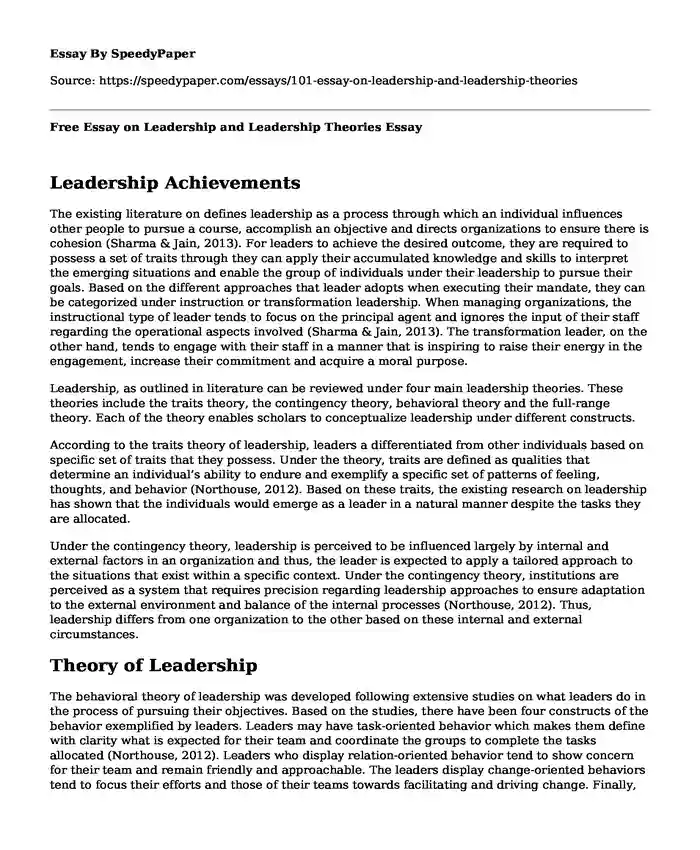
| Type of paper: | Essay |
| Categories: | Leadership analysis Personality |
| Pages: | 3 |
| Wordcount: | 645 words |
Leadership Achievements
The existing literature on defines leadership as a process through which an individual influences other people to pursue a course, accomplish an objective and directs organizations to ensure there is cohesion (Sharma & Jain, 2013). For leaders to achieve the desired outcome, they are required to possess a set of traits through they can apply their accumulated knowledge and skills to interpret the emerging situations and enable the group of individuals under their leadership to pursue their goals. Based on the different approaches that leader adopts when executing their mandate, they can be categorized under instruction or transformation leadership. When managing organizations, the instructional type of leader tends to focus on the principal agent and ignores the input of their staff regarding the operational aspects involved (Sharma & Jain, 2013). The transformation leader, on the other hand, tends to engage with their staff in a manner that is inspiring to raise their energy in the engagement, increase their commitment and acquire a moral purpose.
Leadership, as outlined in literature can be reviewed under four main leadership theories. These theories include the traits theory, the contingency theory, behavioral theory and the full-range theory. Each of the theory enables scholars to conceptualize leadership under different constructs.
According to the traits theory of leadership, leaders a differentiated from other individuals based on specific set of traits that they possess. Under the theory, traits are defined as qualities that determine an individual’s ability to endure and exemplify a specific set of patterns of feeling, thoughts, and behavior (Northouse, 2012). Based on these traits, the existing research on leadership has shown that the individuals would emerge as a leader in a natural manner despite the tasks they are allocated.
Under the contingency theory, leadership is perceived to be influenced largely by internal and external factors in an organization and thus, the leader is expected to apply a tailored approach to the situations that exist within a specific context. Under the contingency theory, institutions are perceived as a system that requires precision regarding leadership approaches to ensure adaptation to the external environment and balance of the internal processes (Northouse, 2012). Thus, leadership differs from one organization to the other based on these internal and external circumstances.
Theory of Leadership
The behavioral theory of leadership was developed following extensive studies on what leaders do in the process of pursuing their objectives. Based on the studies, there have been four constructs of the behavior exemplified by leaders. Leaders may have task-oriented behavior which makes them define with clarity what is expected for their team and coordinate the groups to complete the tasks allocated (Northouse, 2012). Leaders who display relation-oriented behavior tend to show concern for their team and remain friendly and approachable. The leaders display change-oriented behaviors tend to focus their efforts and those of their teams towards facilitating and driving change. Finally, leaders who portray passive behavior tend to be lack initiate in dealing with issues that arise.
The full-range leadership theory provides three typologies under which leadership is evaluated hence tends to accommodate the other theoretical approaches. The theory indicates that there is a constellation of constructs ranging from behaviors such as transformation behavior to laissez-faire approaches (Northouse, 2012). Thus, based on the full-range leadership theory, a leader can determine the behavior that is most effective in handling specific situations.
Leadership is a process where one directs a group of people to achieve a shared goal. There four main theories that can be used to analyze leadership tend to offer different constructs under which leadership approaches are determined. Thus, leaders may exemplify different approaches based on their behaviors, traits or the context in which they operate.
References
Sharma, M. K., & Jain, S. (2013). Leadership management: Principles, models and theories. Global Journal of Management and Business Studies, 3(3), 309-318.
Northouse, P. G. (2012). Leadership: Theory and practice. California: Sage.
Cite this page
Free Essay on Leadership and Leadership Theories. (2018, Jul 27). Retrieved from https://speedypaper.com/essays/101-essay-on-leadership-and-leadership-theories
Request Removal
If you are the original author of this essay and no longer wish to have it published on the SpeedyPaper website, please click below to request its removal:
- Free Essay Example on Nike Analysis
- Performance Management Challenges: Essay Sample on Alibaba Group
- Aging Population as a Global Problem, Free Essay with Argument and Solution
- Design Choice Research Free essay
- Essay Example on M4BL Policy Platform
- The Overall Effectiveness of a Coalition - Free Essay
- Free Essay Example - Contractor's Selection Criteria
Popular categories




